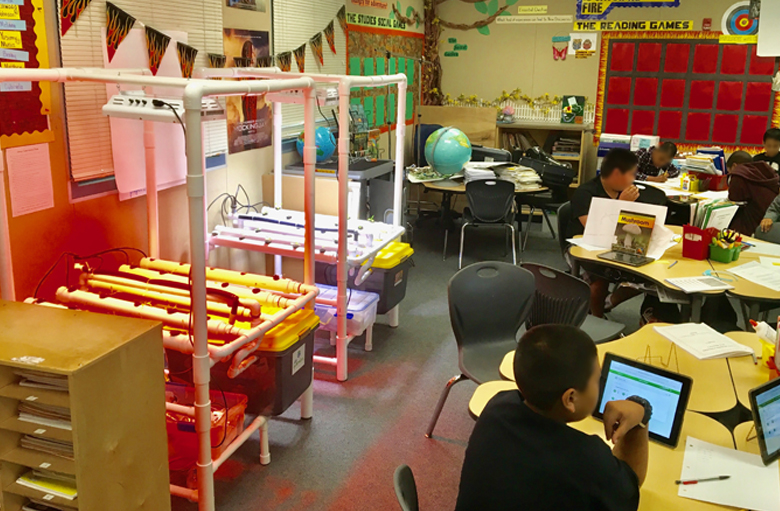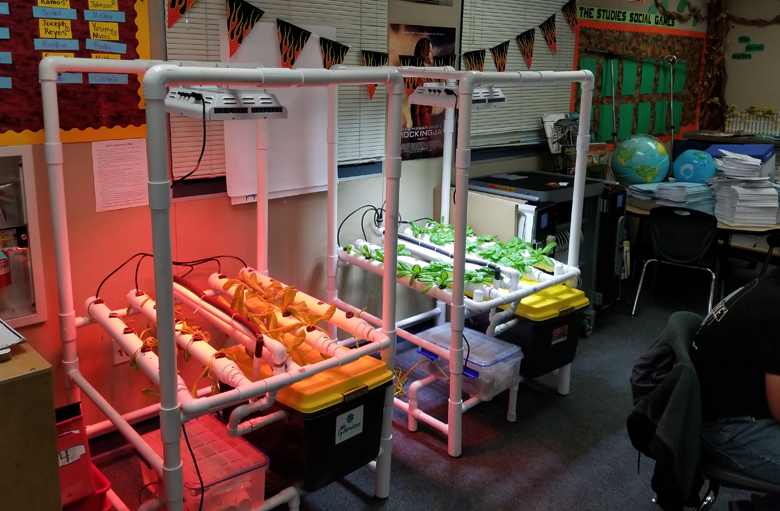HYDROPONIC SCHOOL GARDEN
A fun project based learning tool for grades K-8
Have a small space in a classroom full of students eager to learn? Perfect! Our hydroponic school garden, named MyGarden, is a fun, hands-on, educational, and cinch to operate hydroponic garden that students assemble themselves, growing 25 food plants simultaneously right in the classroom! So little attention is required that your hydroponic school garden operates independently over weekends and even long holiday breaks. Students learn through assembly, set-up, planting and harvesting.
In between they observe germination, plant growth and development (including root systems), and finally harvest. Kids arrive at school each morning excited to watch their plants grow. Grow Plugs, nutrients, seeds, replacement parts, PBL ideas, and teacher blogs and information exchanges online at www.KoolSci.com
Students at all grade levels have lots to learn from hydroponic school gardens
- Plant Growth Cycles: Seeding, imbibition, germination, and growth without the complications associated with soil
- Root Growth: remove and examine entire plants including roots by pulling and then replacing the grow plugs
- Plant Chemistry: Plants take oxygen and carbon from air, hydrogen from water, and nitrogen, phosphorous, potassium, calcium, magnesium, sulfur, iron, manganese, boron, copper and molybdenum from dissolving soil rocks and minerals. In hydroponics salts of these essential elements dissolved in the nutrient solution replace the soil-derived essential elements in exact concentrations. This brings the periodic table to life and demonstrates the essentiality of individual elements.
- Human Nutrition: Plants are amazing chemical factories that make millions of sugars, fats, proteins, vitamins and minerals from these few essential elements that animals including humans require for life and health.
- Plants and Light: Plants use a portion of visible light in the electromagnetic spectrum for photosynthesis and for photo morphological development. The grow lamp can be tuned to different levels of red, blue and green with dramatic effect
UPCOMING TOPICS
- Plants, light, and the electromagnetic spectrum
- Plants, carbon, and global warming
- Proving the essentiality of one or more of the soil-derived elements for plant growth and development
- PH (acidity) and plant essential element update i.e. why do some plants grow only in acidic soils?
- Hydroponic gardening: design your own system and define its advantages and disadvantages
- Growing plants for Mars base support
Project Based Learning
Below is a list of Project Based Learning Concept sheets created by our founder, Dr. Henry Robitaille. These idea sheets assist teachers with the basics and fundamentals of teaching your students via the hydroponic school gardens. Concept sheets are password protected and only available for current KoolSci members. If you are having any problems with a download, please email info@koolsci.com



